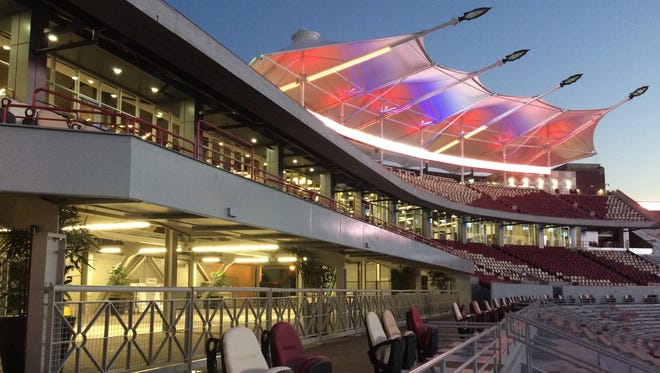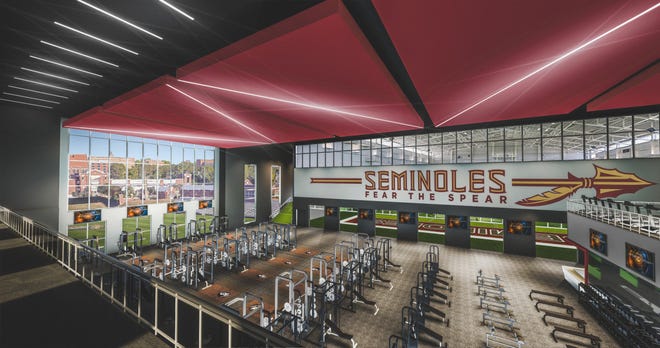1986. The Booster Caboose!
And yes the building to the north of the tracks is the orginal FSU Dev school where College of Medicine is Now
Golden Chiefs Booze Caboose
Does anyone know the back story of the Golden Chiefs Booze Caboose that was in the West side stadium Golden Chief parking lot in the 80's? Jerry's story comparing the 77 team to this team triggered that memory. I recall seeing it as a college student when I attended in the mid 80's. It disappeared when the construction began in the early 90's for the University Center.
Yes - it was allegededly a former President’s train caboose car. The Boosters (George Langford , Charlie B. and Andy M) thought it was a good way to encourage growth in the Boosters and provide a perk to the bigger boosters - back then there was a limited number of Golden Chiefs ( only 24 in 1977) They had the train car they got from Seaboard Coastline Railway and a built wood deck next to it . The car was located on an embankment behind the west stands and pretty much just down the hill from the original players apartment on Hayden Dr. Just south of the current Burt Reynolds hall . The car was pretty much just filled with booze and it was used for a pre-game tailgate for the Golden Chiefs I was a really early scalphunter and we held our monthly meetings at the club car and had access to all the booze - super good memories from the those early days of our climb to prominence - a lot less rules back then.
JERRY KUTZ:
This is an accurate report.
I wasn't a Golden Chief or a Booster employee yet so all I know is what Andy and Charlie have told me including this story about how they grew the number of Golden Chiefs.
In 1976, FSU played Oklahoma and George Langford and Andy, who was only 25 at the time, were invited to sit in the athletic director's box. They were pretty proud of how far they had grown the boosters in one year (Andy started in 1975) and were sharing such with the OK folks. After they settled in, Andy paged through their game program and fell upon the lists of donors.
Where FSU listed all donors in their game program, OK listed only $5000 and above donors and there was page after page after page.
George Langford took it as a personal challenge and the train car became their closing room. They'd invite Tallahassee businessmen and successful Seminoles from around the state to the Train Car for a "free" cocktail and literally sign them up on the spot. George would hand a guy a pledge card and a pen, hold his drink, and lean over so the new Golden Chief could use Langford's back as a desk.
If you add up all the money that was raised as a result of that Train Car over the course of the last 45 years it would be in the tens of millions.
More than one guy said, "The train car served the most expensive drinks in town and they were free."
It actually wasn’t a caboose. It was a club car named the Savannah. My father in law who was a former FSU baseball and basketball player, and who’s dad was the first football coach at Florida State, was a VP for CSX. He was approached with the idea by a group of booster leadership. He went to the chairman of the company and convinced him to donate the old club car. The boosters renovated it and painted it. It remained there by the stadium for several years. It was a cool little place to meet and mingle before and after games.
JERRY KUTZ:
George has been given a great deal of credit over the years as well he deserves. Can you ever do enough for those volunteers who devote their time and money to the program? He took a 24 year old Andy Miller and groomed him into a guy who ran an organization that raised well over a Billion dollars under his watch and Andy gave George credit for every bit of it. George is revered.
As for athletics decisions, many fans think the Boosters have control -- or great influence -- because they raise the money and therefore any Booster president will be blamed, but I can tell you from being there almost 20 years that's not how it works.
I believe FSU does it the right way and that is this: The AD runs the athletic department under the management of the President, who has ultimate authority for ALL decisions made. The Boosters, who also report to the President, must raise the money to fund the budget for the projects, approved by the president. Keep in mind, some presidents want more control than others. But the bottom line is, the AD and the President pick the restaurant and order the meal and the Boosters are responsible for paying a part of the check.
I think the blame of Andy was misinformed or misunderstood. What I mean by that is that when Jimbo wanted an indoor practice facility, he went to the AD or the President to build it. The President and the AD came to Andy to discuss, Andy didn't say no. He asked, where is the money going to come from?
When a head coach comes to the Booster President for a project, the Booster president must redirect him to the AD or the President as the Boosters don't have authority to make those decisions.
When Jimbo wanted the IPF and the Football Building, there was more than $100 million in athletic facility debt already on existing facilities and no new revenue for a bank to justify lending the Boosters any more than we were already committed to.
The Boosters were obligated to pay that bond issue (I think about $5 million each year at that time). There was no excess bonding capacity, in other words all of FSU"s revenues were pledged to the existing debt. In addition, the athletic expenses (about $100 million per year) already exceeded athletic revenues by $17 million, which had to be funded annually by Seminole Booster members annual contributions. Keep in mind, by state law, the university cannot fund athletic expenses, everything must be generated or donated and the budget MUST balance each year
There was no money in the reserve. And the indoor practice facility generated no money.
Andy didn't have the authority to say no. And he had a financial obligation to the creditors, donors and private and state auditors to be fiscally responsible.
The answer was never no. It was we can't borrow it until we create a new revenue stream or pay down our existing debt. Buildings like the IPF or the standalone facility generate nothing and drive the athletic budget up hundreds of thousands of dollars each year in additional utility and maintenance cost.
We managed to raise enough money for the IPF (about $17 million) to get it built in time for the 2013 season, partly with donated cash and largely by increasing our bond commitment against those facility pledges. Remember, most facility gifts are paid over 10 or more years and 30 percent end up uncollectable as people die, get divorced, have financial difficulties or find new interests.
It is a financial reality that you have to have a new revenue source before banks will loan you additional money and/or you have to raise a BOATLOAD of cash.
In 2014, when we learned we had to do $10-20 million in renovations to a portion of Doak's support structure and the metal decks, there was no money in the reserve fund to do it. There was the threat we couldn't open Doak for the 2016 season if we didn't make the renovations. The idea to build a club seat section in the South Endzone, which had been talked about, was approved as the revenue generated by the sale of club seats would generate enough revenue to fund both the cost of the stadium improvements as well as the club seats and eventually provide additional funding for athletics.
Every new athletic project must have a new funding source either by creating a new product or by raising the price of the existing products for the banks pr investors to loan you the money.
JERRY KUTZ
It was before my time but I was told by former AD Vaughn Mancha that the Florida football team came to Doak in 1964 by train and arrived on the tracks between Doak and Coble Terrace. If you, or anyone else, was there, I heard they had "Never FSU Never" on the jerseys or "Go For Seven" referring to their unbeaten record in the first six games. Of course, FSU won that game.
58 years ago, the first time they came to Doak.
I heard years ago that it ended up at C Quarters Marina in Carrabelle FSU Railcar?







